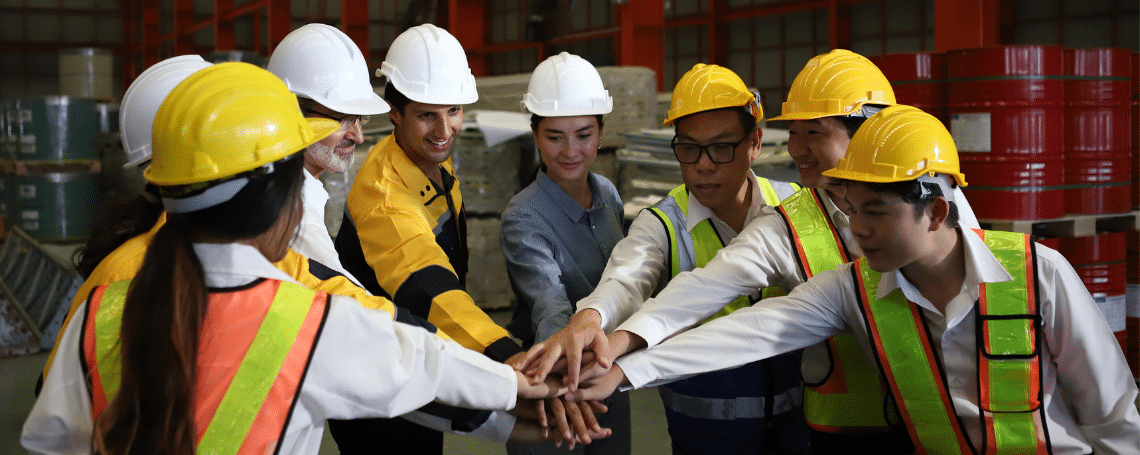New automation processes and digital systems have the power to transform the manufacturing industry, creating factories where innovative teams are supported by real-time data and production lines operate at full capacity. This Fourth Industrial Revolution (Industry 4.0) is a future that many manufacturers are striving for but haven’t quite reached. For the 74% of companies still relying on legacy systems, transformation can feel overwhelming. But adopting advanced technology and automating your operations is only part of the battle. The biggest hurdle is the people behind the technological transformation.
Two-thirds of manufacturers see themselves behind their competitors in digital transformation, and 80% plan to digitize–but resistance from management and employees causes 70% of digital transformations to fail.
From management buy-in to employee engagement, a digital workplace culture, and hiring the right talent, the human element plays a pivotal role in ensuring digital success. Here’s how you can address these challenges and turn legacy practices into a future-ready advantage.
Managers Make or Break Buy-In
Legacy mindsets often shape managers’ hesitation toward digital transformation. Their resistance stems from their familiarity with legacy systems and a need for clear evidence of digitization’s long-term benefits, such as ROI and quality improvements.
Managers are a workplace’s cultural capital: they set the daily standard for team attitudes and values. When managers resist digital migration, so will employees. Successful digital transformation requires managers to generate team buy-in. To drive digital transformation, managers must prioritize consistent communication, address fears of job displacement, and involve employees in the change process. A transparent and inclusive approach will foster trust amongst the team and reduce resistance to digitization.
Tailored change management strategies are essential managerial tools for successful digitization. Managers need to integrate organizational changes alongside technological ones to streamline company-wide transformation. They also must develop scalable, future-focused business plans rather than limit attention to short-term profits that lag behind competition’s innovation.
Joining the Team, Not Replacing
Job security is a big fear for many employees when transitioning to more digital processes. Most employees are more familiar with legacy systems and may lack digital skills. You must reassure your team that digitization doesn’t mean being let go. Provide training opportunities so your team can grow with this transformation rather than be replaced by it.
Invest in consistent training to upskill employees, bridging the digital skill gap while leveraging their experience. Through upskilling and cross-skilling, you can transition team members from automated tasks into new, value-adding roles, fostering adaptability and growth.
Showing your team how digital transformation can boost their work-life balance and job satisfaction is a key way to overcome their resistance. Digitized systems enhance operational flexibility and automation handles the repetitive labor, freeing your team to focus on decision-making and critical thinking tasks. When employees see how digitization maximizes teamwork, efficiency, communication, and productivity, while reducing their pain points, they are more likely to adapt to change.
Embracing a Forward-Thinking Culture
Positive workplace culture is essential for company productivity. To leap forward with digital transformation, a strong digital culture is also necessary. Along with effective managers and experienced existing employees, it is essential to establish core, forward-thinking values regarding technological integration and team cohesion.
Reassure employees that their work is still valued by offering bonuses, recognition, and rewards for employees who show initiative in taking the plunge with the new technology.
Include employee voices and participation in digital migration from the very beginning to increase transparency and foster innovation and problem-solving.
Listen to and act to remedy employees fears and concerns quickly to emphasize an overall culture of improvement and avoid toxicity between managers and team members.
The values and beliefs you and your managers place on technology are what employees will adopt. If you view technology as replacing people, employees will be afraid, resistant, and negative. If you view technology as optimizing employee potential and increasing production efficiency, your employees will align with the success you are seeking.
Accelerating Your Talent Pipeline
Manufacturing as a whole is facing a major hiring challenge as tech sectors compete for the same talent pool. Younger generations (Millennials and Gen Z) are increasingly poised to comprise the majority of the workforce, and they gravitate towards white collar work over manufacturing. Other sectors, like warehousing and construction, face a similar crisis and in some cases compete for similar technologically skilled laborers. More incentives, opportunities, and connections must be forged with the workforce to accelerate manufacturing’s talent pipeline.
Connect with trade schools, universities, and mentorship programs to establish strong community connections with students and professionals just entering the workforce.
Offer competitive compensation, clear career paths, and consistent training as an extra incentive to work with you.
Streamline your hiring process to quickly identify the best fit talent for your positions by focusing on traits that align with success in digital manufacturing, like creativity and adaptability.
As you onboard new talent, remember to consider their culture fit and essential soft skills. Positive workplace culture and digital culture are core motivators for retention, and it is important to hire for longevity. Doing so will pave the way to a future of highly digitally invested employees.
Hiring for Management and Talent
Pre-employment assessments are tools that leverage data-driven, actionable insights to help you make the best hiring decisions. HighMatch offers a suite of customizable assessments to help you pinpoint strong manager candidates and valuable new talent to accelerate your digital transformation.
For Managers
Culture fit assessments determine if a candidate has the skills, personality, values, problem-solving, and conflict management approach to fit and maintain a positive workplace and digital culture.
Job knowledge tests assess a candidate’s industry or role-related knowledge, specialized to your company so you can determine if they have the planning, experience, and insights to lead effectively.
For New Talent
Minimum qualification questionnaires help you pinpoint candidates who match all your basic requirements for success at your company, expediting the hiring process.
Skill assessments give you the chance to rate candidates against your top needs, making it quicker and easier for you to locate talent with your most important hard, soft, and digital skills.
Conclusion
Legacy manufacturers stand to gain long-term ROI by accelerating their digital transformations and achieving Industry 4.0. The people dimension, including managers, existing employees, culture, and hiring, present big challenges for digitized manufacturing. However, addressing these challenges strategically requires a focus on effective leadership, transparent communication, comprehensive employee training, fostering a strong digital culture, and hiring for both skills and cultural alignment.
Partnering with HighMatch gives companies the confidence of starting with the right talent the first time around. Our I/O psychologist-backed assessments and systems provide you with actionable insights and customizable frameworks to give your company the initiative it needs to hit the ground running with digital transformation and the people that drive it.




